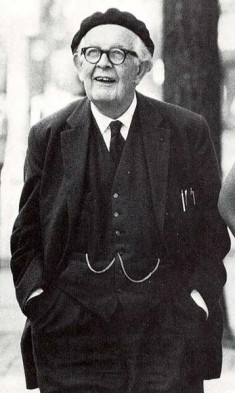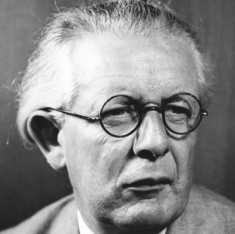| Jean Piaget | |
|---|---|
 |
|
| Psychologist | |
| Born | Aug. 9, 1896 Neuchâtel, Switzerland |
| Died | Sep. 15, 1980 (at age 84) Geneva, Switzerland |
| Nationality | Swiss |
Jean Piaget was a Swiss psychologist and biologist. He was particularly renowned for his theory bringing together epistemology and cognitive development. He held that education was extremely important for children, to the extent that he felt society would inevitably collapse without it.
For the last 35 years of his life, Piaget headed the International Center for Genetic Epistemology. This produced so much material thanks to a variety of collaborative works that it became known as his “factory.” During the 1970s, he was awarded both the Erasmus and the Balzan Prize.
Early Years
Piaget was born in the Swiss town of Neuchâtel on August 9, 1896, the first child in his family. Later, his mother suggested that this had been a contributory factor behind the boy’s tendency toward neurosis, and that this in turn had influenced his deep interest in scientific matters from an early age.
His father, however, was a professor of medieval literature and was probably the main influence for his son’s devotion to his education. When he was 10, Piaget became intensely interested in the natural history of mollusks. He went to the local natural history museum and spent hours simply looking at preserved specimens.
Piaget was sent to the Latin High School in Neuchâtel at the age of 11, and by this time he had become interested in the albino sparrow. On this subject, he wrote a scientific paper. Within two years, he was also writing papers on mollusks, and these were being published and read quite widely.
Those who read his works considered that he must be an expert on his subject, and did not generally know how young the papers’ author was. Once he had left high school, Piaget enrolled at the University of Neuchâtel to study zoology. Again he proved to be an excellent student, and in 1918 he achieved his Ph.D. in natural sciences.
Psychological Work
Also in 1918, Piaget went to the University of Zurich for a semester. Here, he studied psychology and was taught by both Paul Eugen Bleuler and Carl Jung. After receiving a thorough grounding in his subject here, he went to Paris to do research at the Sorbonne. Here, he made a study of abnormal psychology.
By 1920, he had moved on to the Alfred Binet Laboratory, also in the French capital, where he began a collaboration with Théodore Simon. Simon had designed a set of standardized tests to measure reasoning ability in children, and Piaget worked to evaluate the results thereby obtained. The intention of the tests was to show links between the age of each child and the type of errors he or she made.
The insight he gained from working on these tests prompted new questions in Piaget’s mind about learning development in children. He felt that Simon’s test was insufficiently flexible, and began to devise an improved version of his own. This added the ability for a child to explain why a particular “wrong” answer had been selected.
Piaget analyzed the responses the children had given, and deduced that their reasoning ability did not have any inherent flaw. They simply lacked real-world experience to make use of in a number of situations, and logically resorted to their imagination as an alternative strategy. Piaget also realized that understanding and the simple knowledge of facts was not the same thing.
Piaget’s Stages of Childhood Development
 Piaget continued to work in the field of child psychology for the rest of his life, and spent around 60 years of his life studying children’s development. He found that children underwent four distinct stages in their mental development. These stages, which he named schema, began in the first two years of life with the “sensorimotor” stage; here, simple motor actions informed learning.
Piaget continued to work in the field of child psychology for the rest of his life, and spent around 60 years of his life studying children’s development. He found that children underwent four distinct stages in their mental development. These stages, which he named schema, began in the first two years of life with the “sensorimotor” stage; here, simple motor actions informed learning.
From the ages of three to seven, natural intuition took over: this was the “pre-operation” stage. Then there was the “concrete operational” stage, when children began to use hard evidence to inform logical reasoning. Finally, from the age of 12 until maturity, the “formal operational” stage saw the advent of abstract thinking.
The four stages he identified were collectively known by Piaget by the title “Genetic Epistemology.” His work led directly to the foundation of completely novel types of scientific theory, including developmental psychology and cognitive theory.
Later Years and Legacy
In 1972, Piaget was awarded the Erasmus Prize for his work on the conceptual capacity of children. He donated half the prize money to a foundation he had set up, enabling the study of abstract thinking in scientific development. Six years later, he was further honored with the Balzan Prize for Humanities and Natural Sciences.
He died in Geneva on September 16, 1980, at the age of 84. The cause of his death is not known.